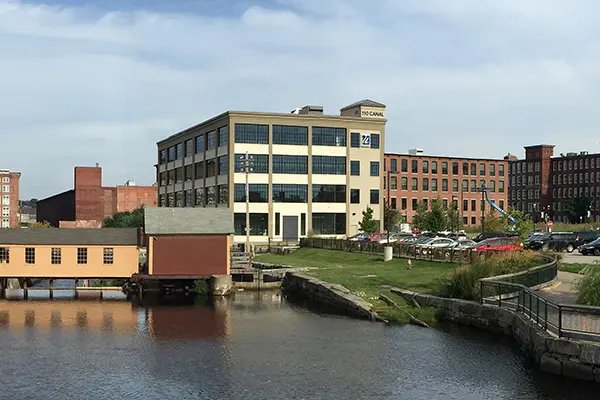State Awards University $11.3 Million for Advanced Functional Fabrics Manufacturing

09/17/2017
By David Perry & Edwin Aguirre
Can the university help launch a 21st-century textile boom of smart fibers and wearable electronics?
That’s what the state is banking on with Gov. Charlie Baker’s announcement earlier this year of $11.3 million for UMass Lowell to establish a Fabric Discovery Center and to support its industry partnerships.
“Massachusetts is a competitive player in the global innovation economy because of our leadership in technology, strong workforce and educational institutions,” Baker said. “This investment will ensure we continue to see that success and growth outside of Greater Boston, and that Lowell will have an opportunity to return to the center of the textile industry.”
It’s been decades since the city’s mills hummed, but the state award – $10 million to create a hub where researchers and industry can collaborate on next-generation smart fabrics and $1.3 million to support a trio of projects with industry partners SI2 Technologies in Billerica and Raytheon in Waltham – sets the stage for Lowell’s emergence as a 21st-century textile powerhouse.
According to the Baker administration, the funding will allow UMass Lowell to acquire the specialized equipment needed to develop materials that can be used in flexible hybrid electronics. Combined with more than $2 million in federal and industry funds for these projects, the investments will help spur future innovations and provide the resources to bring new technology from concept to commercialization.
Baker made the announcement at the university’s Innovation Hub (iHub) at 110 Canal St., a renovated manufacturing building in downtown Lowell. The building’s third and fourth floors now house the university’s two technology incubators – the iHub and the Massachusetts Medical Device Development Center (M2D2). The state funding will be used to transform the first and second floors and part of the canal level of the building into the Fabric Discovery Center, with a total area of 28,000 square feet.
There will be room for prototyping and testing next-generation materials, a startup incubator for emerging businesses and space for workforce development efforts. There will even be a Fashion MakerSpace in which fashion designers and entrepreneurs can create runway-ready fabrics.
The space-age textiles that officials envision include “smart” fabrics with sensors and communications features, says Julie Chen, vice chancellor for research and innovation at UMass Lowell. The high-tech inventions can be woven into designs to do everything from detecting dehydration in soldiers to monitoring buildings for leaking pipes, she says. Other functions embedded within the novel fibers and fabrics include “superomniphobic” geometries to repel all liquids as well as self-healing, energy-harvesting, flame-retardance and tunable mechanical properties.
“The Fabric Discovery Center will leverage existing UMass Lowell capabilities and core research facilities, such as the Nanofabrication Lab, the Materials Characterization Lab, the NERVE Robotics and Rehabilitation Center and the Thermo Analysis and Materials Property Lab, for testing and prototyping,” says Chen.
“With our ongoing leadership in the development of advanced fibers and textiles, medical textiles and flexible electronics, Gov. Baker’s announcement continues UMass Lowell’s strong partnership with the Advanced Functional Fabrics of America [AFFOA], NextFlex, the U.S. Army [Natick Soldier Research, Development and Engineering Center] and the Commonwealth to build the future of high-tech manufacturing in Lowell and across the nation,” says UMass Lowell Chancellor Jacquie Moloney.
The Fabric Discovery Center represents the first collaboration between two national manufacturing innovation institutes, one focused on functional textiles (AFFOA) and the other on flexible hybrid electronics (NextFlex). “The center will help foster synergy between AFFOA and NextFlex. It will serve as a national model for forming a regional hub to connect manufacturing institutes,” says Chen.
A Unique Innovation Ecosystem
The establishment of the Fabric Discovery Center harkens back to the university’s engineering roots when the Lowell Textile School was established in 1895 to educate workers for the Mill City’s booming textile industry. This was followed by the establishment of the plastics engineering program at the Francis College of Engineering in 1955 and the Craig Douglas Advanced Composite Materials and Textiles Research Lab in 1985.
UMass President Marty Meehan notes the “innovation ecosystem” – a critical mass of entrepreneurs, startups, university researchers and creative talent – that has developed in Lowell that will support the Fabric Discovery Center. Not only will industry have access to the university’s research and business development support, but also a pipeline for highly skilled workers, he says.
The Fabric Discovery Center is a perfect fit for the Innovation Hub, where concepts, in the hands of small business, move from idea to industry.
“It benefits UMass Lowell, it benefits the community [and] it benefits the Hamilton Canal District,” a former industrial area in downtown Lowell undergoing dramatic redevelopment, Baker notes.
